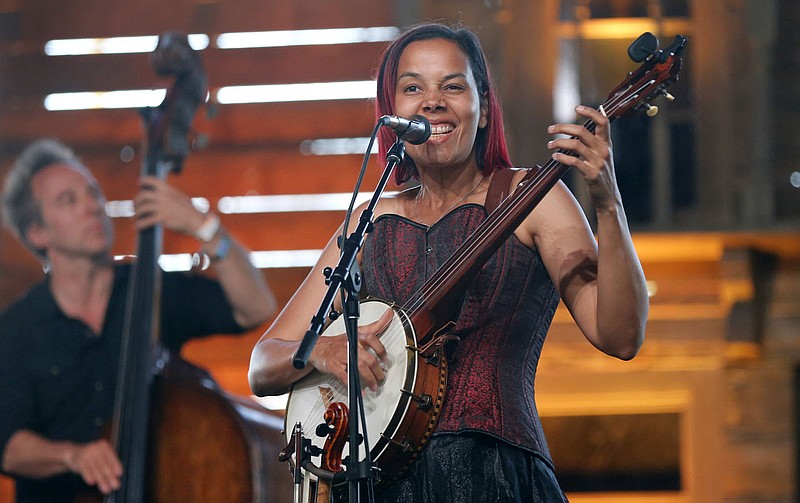What the 20 episodes of the podcast "Aria Code" boil down to is: Why should I care about opera?
Produced by the Metropolitan Opera and public radio's WNYC Studios, each engaging episode breaks down a single aria and works on a couple of levels: Opera lovers can stay in touch with the artform, which won't be presented live for months. And folks who don't know a lot about opera can get a lively introduction.
Chatty Renaissance woman Rhiannon Giddens, whom you may remember from Ken Burns' "Country Music" series, hosts "Aria Code," found at wnycstudios.org/podcasts/aria-code. An insider who's scheduled to sing Bess in a production of "Porgy & Bess" this fall and an outsider who regularly cops to being surprised by details about the music, Giddens says her mission is "to unwrap a classic aria and see what's inside."
A variety of guests help her, and the real genius of the podcast may be its casting.
Most episodes include a musician or two, an academic and someone with an unexpected take on the material, all edited into an aural collage that could include widower Jim Walter calmly breaking your heart as he talks about his late wife in an episode devoted to "Che Faro Senza Euridice" from "Orpheus and Eurydice," or writer Kyoko Katayama offering a real-life "Madama Butterfly."
Each episode's secret is discovering how its participants fit together, just as we all connect to each other.
Take "Butterfly" and the aria "Un Bel di Vedremo," most famously sung by Maria Callas. Although it's beloved, Giacomo Puccini's "Butterfly" is problematic because it victimizes and exoticizes its Japanese heroine, who has a relationship with a visiting American. She believes he loves her, but he actually bought her, and he ends up deserting her and their child.
Something similar happened to Katayama. Her Japanese mother had an affair with her American father at the end of World War II, and while her commentary doesn't grapple with whether "Butterfly" was Puccini's story to tell, Katayama's words about her mom supply a deeply human context.
"What resources did she have?" she asks. "I feel pain for my mother, and actually that's why I agreed to speak to you. I wanted to give my mother some voice she didn't have. I had to wait 70 years to do that."
You don't need to care about opera to be moved by that, or by the discussion of grief in the episode devoted to the "Orpheus and Eurydice" aria.
Novelist Ann Patchett says she discovered the artform while writing "Bel Canto," the main character of which is an opera singer. After completing her subsequent book, "State of Wonder," she realized it was an attempt to speak with her best friend, Lucy Grealy, who had been dead for more than a decade. That's juxtaposed with Walter describing his wife's sudden death.
What does all this have to do with "Orpheus and Eurydice," in which the former character descends to hell to return his lover to the land of living? The universal desire to revisit the dearly departed.
Patchett says grieving showed her the novelist's superpower, the ability to say, "You're dead. I'm bringing you back." Walter talks about how mourning his wife's never-recorded recipe for tomato sauce taught him to cope: "Any time I find myself dwelling on those things, I immediately switch gears to what are all the things we were able to experience before she did pass."
"Aria Code" was created to boost operas produced by companies such as the Met and Minnesota Opera, but it could be more critical. All the "Porgy & Bess" commentators acknowledge problems with the show, including an African-American expert on the characters' Gullah culture and bass/baritone Eric Owens, who says he'll only play Porgy for a company if it hires him for other roles first. But the "Summertime" discussion would be even stronger if it included a participant arguing that this product of white creators is, like "Butterfly," hugely troubling.

